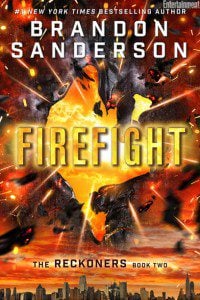
If you read my take on Steelheart you will know that I found the book gripping, even though I had major plot spoilers beforehand but that I also kept the review free of significant spoilers. I will continue the low-to-no-spoilers policy and have obscured certain plot elements from Steelheart for this review.
I actually read the short story Mitosis after Firefight – as I expected, you can jump right in to the second volume without the short, but when I picked up Mitosis I could confirm it does serve as a compelling overture for the second novel. Sanderson here, as with all his sequels, is careful to make the story accessible to new readers and those who need help getting back up to speed – but the reader of previous installments won’t notice a slowing of pace. These stories start with relatively high stakes and then keep ramping them up, slowing only long enough to let the reader draw some breath before increasing the pressure. The sheer frenetic energy of the Reckoner’s stories set them apart from Sanderson’s other work; he doesn’t rely on his usual slow build of events over weeks or months, but rather on squeezing events into days or even hours. Also, rest assured- if anything sounds like it will be an easy way to save lives and get out of danger, it either won’t work or won’t turn out to be easy.
Mitosis begins in typical Sanderson style- by painting a picture of the world in miniature by means of a single city. Newcago, ten years ago our own Chicago, is still mostly made out of the solid steel that Steelheart transformed it into. With Steelheart and his lieutenants gone, the city is no longer shrouded in 24 hour darkness, but open to natural daylight. Newcago has maintained the degree of normal infrastructure that made it famous under Steelheart’s rule, but no longer under the threat of one of the super-powered epics casually murdering the humans. The Reckoners have eschewed rule and settled for maintaining infrastructure and order, so what, under Steelheart, was a puppet human government is now the only instance of non-epic rule in the once United, now Fractured States. So why are the citizens so scared? Why do so many flee the restored daylight to live in the undercity? Why is everyone too frightened to stop on the street when offered a free (Chicago style) hot dog?
Because of the epics. Each was once human but is now more – with a unique set of fantastic powers – but also less – having totally lost empathy for humans. Epics live for their own gratification and with the fear that others will discover and exploit their unique weaknesses; that quirk in their abilities which, if properly exploited, will reduce them to normal humans. When will the epics from other cities come to punish the humans of Newcago for their self-rule? Pretty soon- Mitosis is a self-replicating epic who comes en masse to Newcago seeking to learn the truth of what happened to Steelheart.
Firefight picks up the story with another similar incident- Sourcefield is, like Mitosis, an epic who comes to Newcago seeking not the Reckoners as a group, but the narrator David, reputed to have slain Steelheart. Like Steelheart, Sourcefield is an epic whose powers seem to lack the limits they were recorded to have in the past. In addition to being more powerful than before, these two epics have a previously unseen ability to slightly resist the power loss caused by their personal epic weaknesses.
The Reckoners learn that the threat to Newcago’s hard won freedom comes not from the less powerful epics who have already come calling, but from the supremely crafty ruling epic of Balibar, Regalia. Her ability to see and act through water miles away from herself makes her almost impossible to find and the captive populace of Balibar makes the stakes of challenging her disturbingly high.
As the story progresses the reader may start to question what David at first doesn’t – that the title his reputation has earned him – “Steelslayer” – is very like the names epic pick for themselves, and that the awe in which the populace holds him is also like the way they see epics. Is his willingness to use lethal force on epics (essentially the only thing that has ever stopped an epic from killing humans) so dissimilar from epic disregard for human life? Especially since, once stripped of their powers by the use of their personal weakness, an epic will begin to recover the conscience and fellow-feeling their powers inhibit? David seemingly must find the common thread of all epic weaknesses – if there is one and if it can be used – if there is any hope of sustainable freedom for humanity.
David may not live long enough to find out – as Regalia’s schemes within schemes unfold it becomes clear that the only way to save the thousands of humans living peacefully in Balibar will have a dreadful cost to one of the Reckoners. The Reckoners’ greatest asset in their struggle against epic rule is the epic on their team- a man who has remained sane by using his powers only minimally. To save Balibar, he will have to use them on a grand scale. If they corrupt him he will turn from being the Reckoner’s greatest asset to being their executioner.
On the whole, this series will be jarring to readers of Sanderson’s better know works; I think because he consciously wanted to write in a terser, more anxious style. His characterization doesn’t suffer, exactly, but is done on a more emotional level. It is easier to tell what one of the Reckoners feels than what they are thinking. Some readers will find the sheer number of story elements held in suspense distracting. Lovers of a well-executed plot twist will have their plates very full. I look forward to reading what becomes of the survivors and their world in the concluding volume.

















